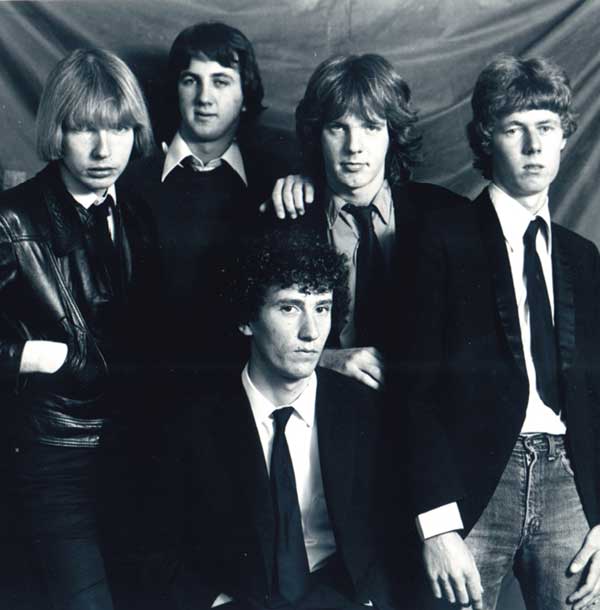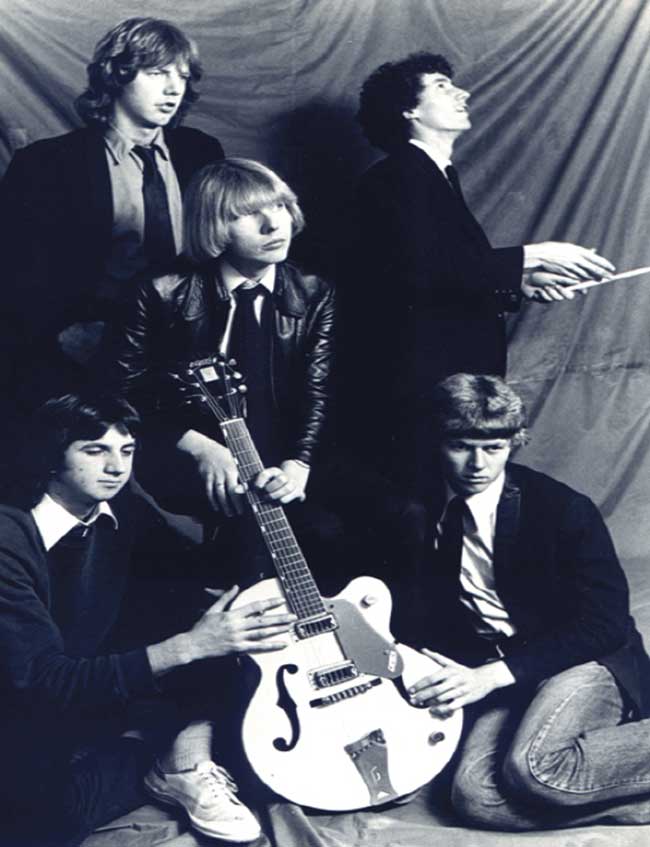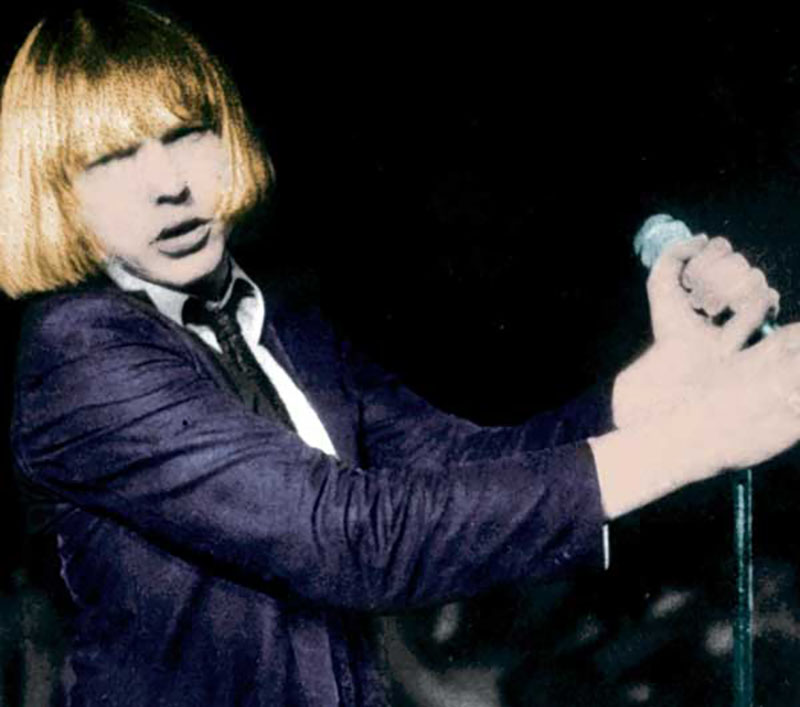Indeed, they had the skinny-tie look and updated Beatles sound down pretty well, but, unlike a lot of the late 70s' power pop stuff that had either a punkiness or an insipid perkiness (the thing which gave 'powerpop' a bad name) about it, Young Modern played with an unaffected earnestness and made music that was soulful and honest.
I've written more than once that Young Modern to me sound more like an early '70s 'pop revival' (to borrow a phrase from Greg Shaw) band like Badfinger, the Sidewinders, Rockin' Horse or Big Star than most of the post-punk era 'power pop' bands, and it was their unaffectedness that makes me think that. Young Modern didn't jump around or try to overstate the energy factor, they simply played the best they could, putting out a sound rich with melody and dynamics and carried by Dowler's wry vocal and the sweet jangle, full strumming and honest tones of their guitars.
It maybe just occurred to me - I'm trying to think in terms that will resonate with yer average I-94 Bar reader here - that Young Modern's music has more in common with the early Sunnyboys and 'Paralytic Tonight'-era Saints than it does with any particular stream of power pop that might include the Raspberries, the Rubinoos or Pezband (all bands I dig by the way). Which brings me to a question that probably means nothing much to anyone other than myself, which is "Why didn't I include Young Modern on 'Do The Pop!?" I kinda wish I had.
At the time I felt Young Modern belonged more to the Melbourne-centric pub rock scene - Dowler had forged strong ties with the aforementioned Sports singer as well as a young Paul Kelly when spending time in Melbourne with his previous band Spare Change - . than with the whole Birdman-related punk and garage-influenced scene. Which I still know is the case, but on a musical level, if the Sunnyboys and the Someloves deserved a place, then so did Young Modern.
Maybe the fact that Young Modern debuted in support of Birdman and had Mort championing them should have given me pause for thought (and maybe the fact that Mort also championed the early Sports in that Bomp! column should have made me realise that there were musical ties between the Melbourne/Carlton scene and Sydney's Birdman-related scene that were worth considering; I also just discovered that Skyhooks released a live version of Garland Jeffreys ' 'Wild In The Streets', the same song that Birdman rewote as 'Insane Alive'... but now I'm really digressing.) Too late now anyway I guess, but maybe all the more reason I feel the need now to urge all I-94 Bar readers to pick up on Young Modern's killer new live album.
 John Dowler (left) and Young Modern: All dressed to jangle.
John Dowler (left) and Young Modern: All dressed to jangle.
'Live...' is probably as good a place to start with Young Modern as any, as it contains pretty much all the best tracks from both 'Play Faster' and the album the band reformed to record in '06 called 'How Insensitive', which featured songs they'd written and played back in the day but never recorded, and which sounds so close in performance and sound to their '78 recordings that, when I first heard it, I actually thought it might be an unheard session from back in the day.
'Live...' also has great versions of a couple of their old live favorites, 'The Singer Not The Song' by the Stones, and 'On Top of the World', a killer pop tune from an early line-up of John Mayall's Bluesbreakers, as well as what I reckon is the definitive version of 'Don't Go To Sydney', a great tune Dowler wrote for his '80s outfit the Zimmermen. Of course, 'Play Faster' is still available on Aztec, and if you think you're gonna like these guys you naturally do need to hear the original recordings, and the aforementioned 'How Insensitive' is, as I said, just as great, so you could probably start anywhere. And if you like what you hear, or what you might have heard in the past, then you need all three.
I caught up with John Dowler for an interview via email in August , just as we belatedly finalising the live album's Trade Mark of Quality/"Live At Leeds" inspired cover art. I began by asking about his pre-Young Modern band Spare Change, in part because their old drummer Graeme Perry had recently given me a copy of a four-song demo they'd recorded in '75 or so, and in a way it slightly altered how I listened to Young Modern. The demo features covers of John Cale's 'Barracuda', Mott The Hoople's 'Rock'n'roll Queen', Sparks' 'Girl from Germany' and, most impressively, a version of the early Springsteen tune 'Growin' Up' with a way better/simpler arrangement than the original - that provide an insight into the origins of John Dowler's music. (The band also performed the Groovies' 'Slow Death' and the MC5's 'High School' - making Spare Change bone fide pre-punk punks methinks, and perhaps worthy of mentioning alongside Birdman and the Saints in that context.)
All I had known of Spare Change really was their 'Lonely Suits' LP, released posthumously around the time Young Modern were winding up. By the time they recorded the LP, the band had developed a sound that was more idiosyncratic and, on the record at least, somewhat more stilted (though not without charm and some good tunes). The demo though, shows a band that was in love with street-level rock, art rock and self-conscious singer-songwriter stuff in equal measure. It's a mix of influences that would probably have been impossible in later times, when punk made some of the influences at least pretty uncool, and it makes me think that Spare Change were trying to do something akin to early Elliot Murphy, or even Hunky Dory-era Bowie.
Anyway, please welcome Mr. John Dowler....
So John, tell me about what you are the other members of Spare Change were listening too - apart from the Cale, Sparks, Mott and Springsteen songs on the early demo - and what kind of correlation you saw between these stylistically different artists. I'm hearing something maybe like Elliot Murphy or Bowie, which is maybe also reflected in the look of the band and the European visual aspect.
JD: Various members of the group were obsessed with Dylan, the Velvet Underground, Bowie, Roxy Music and the artists you've already mentioned. I also favoured the MC5 and the Flamin' Groovies and other artists with "power pop leanings". When we first started we had no original material of our own so covers of the VU, Dylan, Elliot Murphy, the Winkies and even Amon Duul were the order of the day. By the time we moved to Melbourne we had enough of our own compositions to record an album, which is the material that you characterize as stilted and idiosyncratic. Our live sets consisted of a mixture of originals and covers right through to the end.

I assume SC reached a level of popularity in Adelaide, prompting the move to Melbourne? can you talk about about the scene you found in Melbourne when Spare Change moved there? Steve Cummings became a friend. Paul Kelly moved over from Adelaide and you shared a house with him. What were people listening to? How did it influence you? Did you and Spare Change influence it?
JD: When Spare Change moved to Melbourne in early 1975, the so-called "Carlton Scene" was at its zenith. Bands like Jo Jo Zep, the Bleeding Hearts, the Sports, the Millionaires and Stiletto dominated a live circuit that revolved around Martinis and Hearts in Carlton, and the Kingston Hotel in Richmond. Venues were packed with enthusiastic crowds every night of the week and we seemed to slot into the "scene" with ease.
We soon struck up friendships with many of the above bands who seemed more impressed with our sartorial efforts than they were with our musical endeavours. (Hard to believe, I know if you've seen the cover of SC's "Lonely Suits" LP). We introduced many of these people to their first real exposure to likes of the VU, Groovies and Big Star, or at least, that's the way I remember it. Members of SC went on in later years to play in such Melbourne stalwarts as Man & Machine, the Dots and the Zimmermen. In fact four out of the five SC members live in Melbourne to this day.
I'm assuming there was a conscious move away from a lot of these things when you decided to form YM? What do you see as the stylistic links between SC and YM , if any? How closely did you follow the power pop scene as it did become more codified and aligned with punk/new wave in the late '70s? I know you had the Nerves and Scruffs records, and I assume you were aware of what Bomp! was doing? Young Modern was a more or less conscious attempt to be part of that?
JD: I formed YM with the express idea of exploring a more straight forward guitar-based pop style. I was definitely inspired by Big Star and the Groovies, but Andrew and Vic (the other songwriters in the band) were very much in thrall to the Beatles and the Stones. It was a happy confluence of influences that resulted in a quite distinctive YM repertoire. I don't think that there were any stylistic links to SC apart from my vocals and a tendency to keep the songs short and sweet.
Although I never considered YM part of any particular movement, I was happy to appropriate the "powerpop" tag as a means to promote the band. Similarly I was content to be lumped in with the Punk/New Wave groundswell if it made our music seem more relevant to the public at large
Q: Andy Bradley was from Melbourne and wrote about YM in Bomp. YM played with Radio Birdman, who Andy was working for by then. Was Andy your connection to that scene? When YM finally went to Sydney, how come you seemed to avoid that Phantom Records/post-Birdman scene and just do the Angels/Chisel circuit?
Did you see any other the Sydney bands that may or may not have been more welcoming - the Passengers, the Hitmen etc? I know you'd seen and disliked the Psycho Surgeons when they played in Adelaide - you mentioned that in an interview in Roadrunner at the time - so I'm guessing you didn't like the more Stooges-influenced punky stuff, but you had done an MC5 cover in Spare Change so you were obviously familiar with the influences.
JD: Our very first gig was supporting Radio Birdman in Adelaide. I don't remember how we got it and I don't really have any recollection of Andy Bradley. The reason we went to Sydney was because (management company) Dirty Pool was based there. In retrospect, we should have based ourselves in Melbourne where the crowds were always more empathetic and supportive.
We didn't consciously avoid the Phantom scene. We were tied into the Angels/Chisel circuit because we shared the same management and booking agency. I seem to recall sharing the bill with the Hitmen on many occasions and I remember Johnny joining us on stage for a rousing version of "Countdown" on at least one occasion.
I assume YM just split because Sydney became too much of a grind? How did you feel when you saw the Knack hit the charts following your split with a similar look and style? were you tempted to form another band like Young Modern? Your next band, Talk Show, was more of return to the pre-punk influenceses. Everybody's So Glad were vaguely similar stylistically but didn't really have the look from memory.. You had a band with members of the Marching Girls in the interim - what was that like?
JD: Your assumption is correct. We were playing 5-6 gigs a week to generally indifferent audiences while racking up debts paying for PA's, lights and touring trucks. Mark Carroll decided that he'd had enough and the thought of having to go through endless auditions to find a suitable replacement was abhorrent to me, so I pulled the plug and headed for Melbourne at the end of the year.
I didn't really see any similarities between YM and the Knack (apart from the skinny ties) and I never really considered forming a YM part two. Talk Show, given the personnel, was basically a continuation of the Spare Change rubric . Everybody's So Glad was just a band I fell into which lasted for about eight months and my tenure with the Marching Girls fizzled out after about three rehearsals. We were playing about five of their songs and two or three of mine.
How did you see your later band the Zimmermen in terms of what you'd done with Young Modern?
JD: The Zimmermen seems to me to be a natural extension of the YM tradition. Not nearly as endearing and with a pronounced country influence.
Jumping forward to recent years - I assume the YM reformation was prompted by the Aztec reissue? It's obviously been a positive and enjoyable thing for you, given it's now resulted in two albums? Any thoughts or feeling about it you'd care to share? 'How Insensitive' is an amazing revisitation of the band's original sound, as is the new live album - you agree?
JD: When we caught up after the reissue of "Play Faster" in 2005, I hadn't seen any of the guys in over 25 years! We mulled over the idea of playing a couple of shows but decided that recording a new album would be a more rewarding thing to do. It seemed to turn out pretty well, effortlessly recapturing that elusive YM sound.
The shows to launch "How Insensitive" were great fun and well-received so it seemed a no-brainer to play a "Christmas Show" last December in Adelaide. The decision to record the show for posterity was a last minute one, but despite a few ropey moments, the CD stands as an accurate record of the night, warts 'n' all.
So what have you been listening to since YM days? I know you've been putting together George Jones collections for Raven. Do you still enjoy the old so-called power pop bands, and are there any newer bands in that broad style you like?
JD: Yes, I've compiled some George Jones collections for Raven, but I've also done the same for Dwight Twilley, Bo Diddley, Lee Dorsey, Bobbie Gentry, Stories, Percy Mayfield, Glen Campbell, Dolly Parton, Roy Hamilton, Al Green and many others. I still listen to the old power pop bands, but only occasionally. As for the Byrds-Beach Boys-Big Star triumvirate that so dominated my listening in my late teens and early twenties, they have become such a part of my musical DNA, that one listen every five years or so is enough to bring it all rushing back.
Most of my listening time is spent on new/current releases and only a tiny percentage of these could be classified as "powerpop". Having said that, relatively recent releases by Brent Cash, Darker My Love, the Red Button, Splitsville, Spygenius and Rick Altizer manage to scratch that power-pop itch more than adequately.
"Live at the Grace Emily" is out now on Grown Up Wrong! through Fuse Music.


